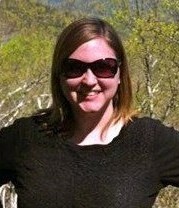Lauryn Bragg
One of the things Africa ELI benefits from the most is the variety of academic and vocational backgrounds found among its board members and volunteers. New ideas and approaches are born from this array of knowledge and skills. Lauryn Bragg definitely does her part to add to the diversity. Her academic background is in social science, and she holds a Bachelor of Arts in Anthropology from the University of Tennessee. She currently works at Oak Ridge National Laboratory as a Research Assistant in Population Distribution and Dynamics. She has done research in rural housing and tribal settlements in Nigeria and Botswana, in addition to population density research in schools and hospitals across Africa.In order to get to know her better, I asked Lauryn a few questions about her work, her other interests, and her role as a board member at Africa ELI.
Q: Your work in geographic information science sounds interesting. Can your describe a bit more about your research involving population dynamics in Africa?
A: It is interesting! Most of the work I have done in Africa involves population density in schools, hospitals, refugee camps, and universities. In other words, I mine data in order to measure the area of a building, then use a formula to calculate the building’s occupancy. I also try to pinpoint what cultural factors influence high occupancy in these facilities. I believe that in order to fully understand what is happening with occupancy numbers, one needs to understand the culture of that specific country. I also delve a little into settlement patterns of tribal cultures. You can identify what kind of tribe you are looking at just by imagery analysis.
Q: What are some of your interests and activities outside of work?
A: Well, other than Africa ELI, I am also an officer for the Mid-South American Society for Photogrammetry and Remote Sensing. I am a student at the University of Denver pursuing an online graduate certificate in Geographic Information Science. I try to go to the gym as often as I can, and I bike and kayak. Right now, I am interested in sustainable communities and helping developing countries become sustainable, especially after a disaster, without having to rely heavily on foreign aid any longer than necessary.
Q: What do you see as your role at Africa ELI? What plans do you have for your tenure there?
A: I see myself being an asset when it comes to fundraising and bringing awareness to the critical work of Africa ELI. I can design visuals and create maps to help future donors understand what we offer to girls and young women in South Sudan. Toward that goal, I consider it beneficial to have a vast professional network with whom we can foster partnerships for greater impact in educating girls. I would love to see Africa ELI’s participation in conferences, university visits, and speaking engagements increase. This requires finding sponsors to finance travel to events for Anita or other Africa ELI personnel. With the field work and experiences of our organization, we could contribute significantly to public discourse about establishing and implementing secondary education in a conflict-ridden environment. Such relationships would further benefit Africa ELI by helping us to identify grants and additional funding opportunities for serving our students.

